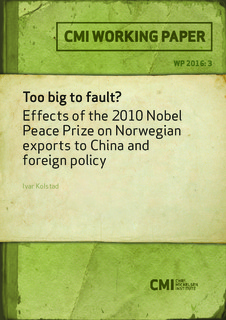Too big to fault? Effects of the 2010 Nobel Peace Prize on Norwegian exports to China and foreign policy
Original version
Bergen: Chr. Michelsen Institute (CMI Working Paper WP 2016:03)Abstract
Abstract In October 2010, the Norwegian Nobel Committee awarded the Nobel peace prize to Chinese dissident Liu Xiaobo. The Chinese government responded by freezing political and economic relations with Norway, introducing sanctions against imports of fish and other products, and limiting diplomatic interaction. Using a synthetic control approach, this paper estimates the effect of Chinese sanctions following the peace prize on Norwegian exports to China, and on Norwegian foreign policy. Allowing for potential interference (effects of the sanctions on control units), we find that the sanctions reduced direct exports of fish to China by between 125 and 176 million USD in the period 2011–13, and direct total exports from Norway to China by between 780 and 1300 million USD. By 2014, however, exports had rebounded to normal levels. One possible explanation for this normalization could be Norwegian government efforts to distance itself from the peace prize committee, and a weakening of the Norwegian foreign policy position on human rights. This paper shows that immediately following the peace prize, Norwegian agreement with Chinese voting in the United Nations on human rights resolutions increased. The results suggest that the Chinese government can effectively use economic sanctions to affect the foreign policy positions of democratic governments, with potentially chilling effects for international progress on human rights. China has become too big to fault. Keywords: Sanctions, trade, foreign policy, international political economy, China, Norway JEL codes: F14, F51, F53, P33
